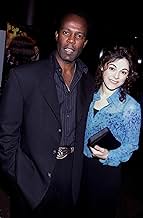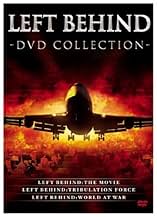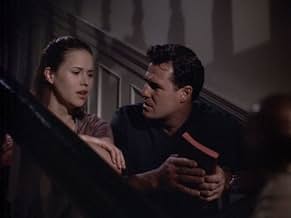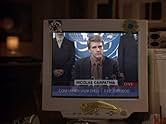Füge eine Handlung in deiner Sprache hinzuThe Biblical prophecy of Armegeddon begins when the Rapture instantly takes all believers in Christ from the Earth. A reporter left behind learns that the Anti-Christ will soon take power.The Biblical prophecy of Armegeddon begins when the Rapture instantly takes all believers in Christ from the Earth. A reporter left behind learns that the Anti-Christ will soon take power.The Biblical prophecy of Armegeddon begins when the Rapture instantly takes all believers in Christ from the Earth. A reporter left behind learns that the Anti-Christ will soon take power.
- Auszeichnungen
- 3 Nominierungen insgesamt
- Bruce Barnes
- (as Clarence Gilyard)
- Alan Tompkins
- (as Philip Akon)
Empfohlene Bewertungen
But there are other vapid movies out there too. What makes this (and 'Omega Code') so fascinating is that they were not intended to entertain, even to enlighten, but to proselytize. And some day soon this crowd will cease to be so amateurish -- down the street from me is Pat Roberstson's film 'university' with a virtual endowment of billions and the intent of being professionally slick. What then?
It is an interesting question. As it stands now, we have films that are made for profit. Most of these pander in some way. Then we have films that are made as art. Some of these pander as well. And we have propaganda films of various sorts whose purpose is purely to convince/convert/affirm. Of these, the latter are the only truly pornographic.
I think that as religious films become better and more common (they will), they become fair game for satire. Imagine a Scream about the apocalypse cults. Then instead of massive protests against a respectful film like 'Last Temptation' (shots were fired here!) what will we get? Imagine class war.
The film and the books behind it aren't very biblically accurate in any case. The rapture metaphor comes from Darius, who incidentally rebuilt the temple the first time, and invented modern Judaism as an experiment. Currency has been unified since then, 2500 years with only the names kept nationally. That's what is referenced in the B. Darius also revived Zoroastrianism which mixed with later Judaism to produce the essenism of John which Jesus adopted.
This in fact is not a film with Christian theology at all. They even fumbled that.
Just from the standpoint of production value, screen writing, and movie making, this movie fails on many levels, though it succeeds on a few as well. What can you expect from a low-budget, "B" movie? Not much, and it works from the standpoint of production. However, the writing is certainly disjointed, with little in the way of character development...exactly what I'd expect when there is an agenda to a film. I didn't have a problem with the acting...the cast is solid; however, the screenplay in both movies gives the actors little opportunity to really stretch themselves. Because the film is "Christian," this is predictable, as you can't very well portray violent chaos of the "end times" without also breaking some of the ethics which are normally associated with Christianity. In other words, the mistake comes in making this into a G-rated film when the content, even in the most conservative of Bible interpretations, would be R-rated by any measure. So, if the purpose of the movie is to scare people into Christian faith, then the movie should be somewhat scary, right? However, you can't comment on a film adaptation from a book without commenting on the book, or in this case, series of books. There are certainly plenty of Christian materials worthy enough to be made into movies...but not the "Left Behind" series...and these movies ultimately fail because, while being best-sellers, they are poorly written novels based on bad theology.
As a Southern Baptist minister, I confess that the books were a guilty pleasure for me, though I have yet to finish the last two books of the series. I have described them as decent fiction, and if the books would take the point of view that this is one "possibility" or interpretation of the subject of biblical eschatology (study of the "end times), then I could live with that. However, this series is divisive in Christian circles because it promotes the "literalist" interpretation of all Scripture above a more proper hermeneutic. Inevitably, this leads to the "pre-trib, pre-millenial" dispensation point of view, which confines an all-powerful God far too by humanity's world. In other words, as I've always said, God shouldn't need our helicopters and bombs to do his ultimate work. But because many people, particularly unstudied Christians, can't think beyond their own world-views, we are left with a pro-conservative, fundamentalist stance with regard to Bible interpretation, and attempts to push it through as the "only" interpretation.
Thus, the books carry with them an agenda, not so much to get the "lost" to understand their need for Christ, but to state that the fundamentalist point of view is the only valid way to understand the Bible. I recall very clearly reading (several years ago) in the second novel a scene where the characters reference a person who was "left behind" BECAUSE of his non-adherence to this point of view; as if "real" christians worthy to be "raptured" couldn't possibly hold to another eschatology. This is disturbing for several reasons, the least of which is because a "rapture" is only briefly mentioned in Scripture and it's connection to real, end-time prophecy is tenuous at best.
But the real issue with these books is comes in the way they divide the Christian community and how they portray "true" Christian behavior. Ultimately, I feel they harden more people to an otherwise legitimate faith/religion instead of win people towards it. It turns all Christians into caricatures, equally disdained and laughed at by the world despite the fact that there is theological room for a wide diversity of believes within Christian thought and practice. As a Christian body, on the whole, we've done enough of that kind of damage to society over 2000 years of history...and we certainly don't need to promote it by film to thousands, maybe millions of others.
Thus, the "Left Behind" movies fail because the "Left Behind" books aren't worthy to be interpreted into movies.
Now, I realize that when a movie attempts to capture the essence of a book, there have to be some sacrifices as far as details. I have read the book several times, and the movie somehow does not capture much of what the book conveys. Maybe it is time constraints that come with making a movie within, say, 90 minutes to 2 hours. But this movie seems rushed somehow. It did not let certain plotlines develop. In the book, Rayford only lusted after the stewardess, where in the movie, it seemed like it went a bit beyond that. Also, early in the movie, it seemed that Buck Williams already had a relationship with the Steele Family before the Rapture where it did not germinate until towards the end of the Left Behind book.
Maybe it was because of the low budget and time constraints. I remember when Kirk Cameron was fired up about doing the movie after reading the book. The funny thing is that this movie was produced without paying any attention to the details that made this book such a best seller. The basic idea behind the novel held true to the movie, but many key elements in the book were ignored.
My advice: Read the novel series, see the movie if you must for comparison's sake, not as a viable substitute to the novel.
I hope anyone who sees it who doesn't 'get it' or who feels that only fundamentalist christians can really understand it will just open their bibles. I had friends who saw X-Men and got me to read some of the comics saying I'd enjoy the movie more if I did. They were right. So why is it so terrible to say crack open your bible and check out the stuff?
Sometimes it really makes me laugh. If you wanted to become a lawyer you'd learn contract law, study the constitution and various cases before taking the bar. You wouldn't attempt to pass the bar exam by talking to friends about their opinions and watching "The Practice." But people who believe in God don't read His book. And admitting that you've "studied the bible," which, in the long run, will also make you more literate, is akin to saying you have a communicable disease; people stare at you and back away.
Open it up. Not only does it give guidelines on how to live, it gives you promises for what comes after. And if nothing else, it will give you a clue what this movie is all about.
Wusstest du schon
- WissenswertesReleased directly to video in 2000, copies of the film came bundled with a free pass to watch the film in theaters when it was later given limited release in early 2001.
- PatzerThe flags flying outside the real United Nations building are of the member nations. The ones shown are of Canada's provinces.
- Zitate
[Watching TV]
Chloe Steele: Turn that up.
Raymie Steele: Mom said to turn it down.
Chloe Steele: You always do what you're told?
Raymie Steele: Yeah, you should try it sometime.
- Crazy CreditsThe Producers wish to thank: Karll Goodman (who inadvertently vanished during editing)
- VerbindungenEdited into Left Behind: Like Son (2013)
Top-Auswahl
- How long is Left Behind: The Movie?Powered by Alexa
Details
- Erscheinungsdatum
- Herkunftsland
- Offizieller Standort
- Sprache
- Auch bekannt als
- Left Behind: The Movie
- Drehorte
- Produktionsfirmen
- Weitere beteiligte Unternehmen bei IMDbPro anzeigen
Box Office
- Budget
- 4.000.000 $ (geschätzt)
- Bruttoertrag in den USA und Kanada
- 4.224.065 $
- Eröffnungswochenende in den USA und in Kanada
- 2.158.780 $
- 4. Feb. 2001
- Weltweiter Bruttoertrag
- 4.224.065 $
- Laufzeit1 Stunde 40 Minuten
- Farbe
- Sound-Mix
Zu dieser Seite beitragen




































